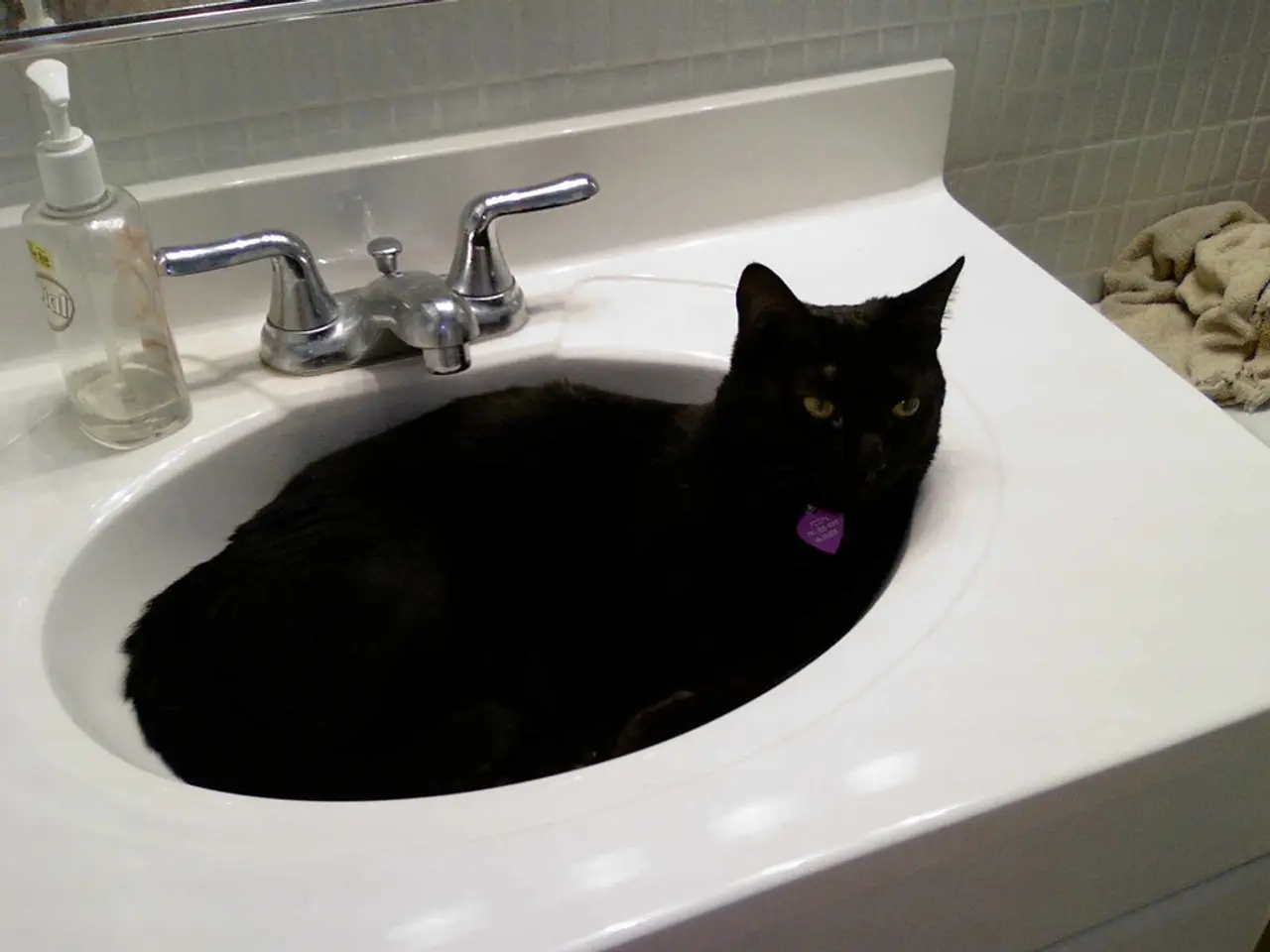Cat Sneezing: Is It an Allergy Issue?
Persistent sneezing in cats can be a sign of various underlying health issues. Understanding the causes and potential complications is essential to ensure your feline friend stays healthy. Here are some common reasons for persistent sneezing in cats.
Upper Respiratory Infections (URIs) are one of the most common causes, often caused by viruses such as feline herpesvirus-1 and feline calicivirus. These viruses are highly contagious and can lead to symptoms like sneezing, congestion, and nasal discharge [1][2][3].
Another cause could be foreign objects lodged in the cat's nose, such as grass or dirt, which can cause irritation and frequent sneezing [1]. Environmental irritants, such as dry air, cigarette smoke, cleaning products, and strong perfumes, can also irritate the nasal passages, leading to sneezing [1].
Allergies are less common in cats than in dogs but can cause repeated sneezing or skin irritations [4]. Chronic respiratory conditions, such as feline asthma and chronic sinusitis, can also cause persistent sneezing [1].
Ear infections can sometimes result from allergic reactions, characterized by scratching, redness, and discharge [4]. In some cases, allergies can also cause gastrointestinal symptoms like diarrhea, vomiting, and changes in appetite [4].
If your cat's sneezing persists, becomes more frequent, or is accompanied by other signs like nasal discharge, loss of appetite, or lethargy, it's crucial to seek veterinary care. Bacterial or fungal infections can follow initial viral infections as secondary infections, leading to persistent sneezing, nasal discharge, and difficulty breathing [2]. Chronic rhinitis or chronic respiratory conditions can develop in cats with repeated infections, especially older cats or those with weakened immune systems, causing frequent sneezing and long-term nasal inflammation [3].
In addition to maintaining a clean environment, keeping cats indoors and ensuring regular vaccinations can help support their health [5].
This article was created with AI technology and fact-checked and edited by a HowStuffWorks editor.
References: [1] "Persistent Sneezing in Cats: Causes, Diagnosis, and Treatment." VCA Hospitals, 17 Mar. 2020, [www.vcahospitals.com/know-your-pet/persistent-sneezing-in-cats-causes-diagnosis-and-treatment](http://www.vcahospitals.com/know-your-pet/persistent-sneezing-in-cats-causes-diagnosis-and-treatment). [2] "Feline Upper Respiratory Infections." Cornell Feline Health Center, 16 Aug. 2018, [www.vet.cornell.edu/departments-centers-and-institutes/cornell-feline-health-center/health-information/feline-health-topics/feline-upper-respiratory-infections](http://www.vet.cornell.edu/departments-centers-and-institutes/cornell-feline-health-center/health-information/feline-health-topics/feline-upper-respiratory-infections). [3] "Feline Asthma." The Cat Hospital at Towson, [www.towsoncat.com/feline-asthma](http://www.towsoncat.com/feline-asthma). [4] "Allergies in Cats." Cornell Feline Health Center, 16 Aug. 2018, [www.vet.cornell.edu/departments-centers-and-institutes/cornell-feline-health-center/health-information/feline-health-topics/allergies-in-cats](http://www.vet.cornell.edu/departments-centers-and-institutes/cornell-feline-health-center/health-information/feline-health-topics/allergies-in-cats). [5] "Indoor Cats: The Indoor Environment." Cornell Feline Health Center, 16 Aug. 2018, [www.vet.cornell.edu/departments-centers-and-institutes/cornell-feline-health-center/health-information/feline-health-topics/indoor-cats-the-indoor-environment](http://www.vet.cornell.edu/departments-centers-and-institutes/cornell-feline-health-center/health-information/feline-health-topics/indoor-cats-the-indoor-environment).
- Regular veterinary check-ups and vaccinations, as part of a healthy lifestyle, can help prevent various feline health issues, including Upper Respiratory Infections (URIs), which are linked to viral infections like feline herpesvirus-1 and feline calicivirus.
- Science, particularly the field of veterinary medicine, has identified environmental factors, such as dry air, cigarette smoke, and strong perfumes, as causes of sneezing in cats due to irritation of the nasal passages.
- Adopting a technology-driven approach to manage your home environment, like investing in air purifiers or humidifiers, might help reduce airborne allergens and irritants, potentially benefitting your pet's health and wellness by reducing the frequency of persistent sneezing in cats.




